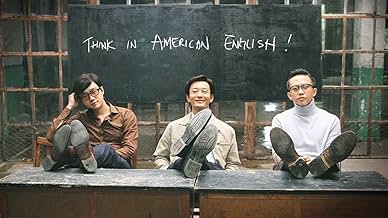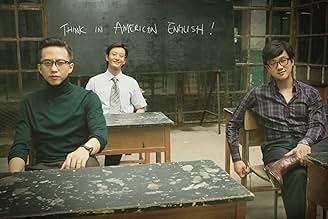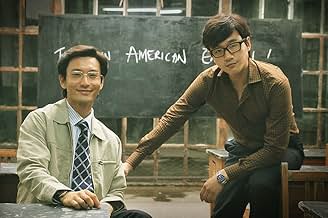Zhong Guo he huo ren
- 2013
- 1h 52min
VALUTAZIONE IMDb
6,9/10
3018
LA TUA VALUTAZIONE
Aggiungi una trama nella tua linguaThe story of three friends who build a successful English language school in China called "New Dream". This school helps the dreams of Chinese teenagers come true. Before they stood proudly ... Leggi tuttoThe story of three friends who build a successful English language school in China called "New Dream". This school helps the dreams of Chinese teenagers come true. Before they stood proudly in the American stock market, many stories happened with them.The story of three friends who build a successful English language school in China called "New Dream". This school helps the dreams of Chinese teenagers come true. Before they stood proudly in the American stock market, many stories happened with them.
- Regia
- Sceneggiatura
- Star
- Premi
- 31 vittorie e 32 candidature totali
Tina Collins
- Girlfriend
- (voce)
Recensioni in evidenza
I thought Chan Ho-sun's latest movie, American Dreams in China, would be a more masculine version of Zhao Wei's So Young. But not quite, as it turns out.
Although the film depicts a nostalgic campus life full of idealism for the future and the impulses of love, the story is more about starting out after innocent youth has faded.
Through the intertwined destinies of the movie's protagonists, the audience witnesses a triangle of friendship, career ambitions and personal dreams seemingly collapse as three best friends desperately try to tie and twist these elements together.
That's why Wang Yang (Tong Dawei), one of the three best friends, who start a business together, shares this lesson of life: "Never start a business with your best friends."
He may be right. After all, no matter how close they are, differences in their professional and personal aspirations can drive friends apart. Every individual has a distinct outlook on the world and their future, which determines the trajectory of their career and life.
Without knowing of Meng Xiaojun's (Deng Chao) struggles in the US and his disillusion toward the country, there's no way Cheng Dongqing (Huang Xiaoming) can understand why Meng is pushing all the agendas so hard. The parting of the invincible trio, to some extent, is predestined.
Even so, despite these differences, friendship always prevails. Cheng's difficulties become a podium on which the three friends stand together. It's through the emotional connection they developed over many years that they finally overcome their differences and reform the alliance.
What the film tries to convey is the triumph of brotherhood, which dates back to our naive, passionate youth when unconditional bonds of emotion are shaped.
So the film was never about business after all.
Although the film depicts a nostalgic campus life full of idealism for the future and the impulses of love, the story is more about starting out after innocent youth has faded.
Through the intertwined destinies of the movie's protagonists, the audience witnesses a triangle of friendship, career ambitions and personal dreams seemingly collapse as three best friends desperately try to tie and twist these elements together.
That's why Wang Yang (Tong Dawei), one of the three best friends, who start a business together, shares this lesson of life: "Never start a business with your best friends."
He may be right. After all, no matter how close they are, differences in their professional and personal aspirations can drive friends apart. Every individual has a distinct outlook on the world and their future, which determines the trajectory of their career and life.
Without knowing of Meng Xiaojun's (Deng Chao) struggles in the US and his disillusion toward the country, there's no way Cheng Dongqing (Huang Xiaoming) can understand why Meng is pushing all the agendas so hard. The parting of the invincible trio, to some extent, is predestined.
Even so, despite these differences, friendship always prevails. Cheng's difficulties become a podium on which the three friends stand together. It's through the emotional connection they developed over many years that they finally overcome their differences and reform the alliance.
What the film tries to convey is the triumph of brotherhood, which dates back to our naive, passionate youth when unconditional bonds of emotion are shaped.
So the film was never about business after all.
Technically I think this movie's made very well, but its message is very nationalistic and panders to the Chinese Communist Party and the masses (which is fair enough I suppose for a commercial film).
Especially the film's latter half focuses on the rise of China, and there is a clear message that Chinese people are inherently cleverer, more moral and generally better than stupid Americans who are only economically at the top due to their aggressiveness and luck. There's also a very odd message in the film about racism in the USA, which seems quite irrelevant to the plot of the film and just another way for the film to push home the message that Chinese people are a better people than Americans.
If you don't read into the message too much (which is hard considering how hard it's pushed home), it's quite an enjoyable film of three young men's struggle and rise to the top.
Especially the film's latter half focuses on the rise of China, and there is a clear message that Chinese people are inherently cleverer, more moral and generally better than stupid Americans who are only economically at the top due to their aggressiveness and luck. There's also a very odd message in the film about racism in the USA, which seems quite irrelevant to the plot of the film and just another way for the film to push home the message that Chinese people are a better people than Americans.
If you don't read into the message too much (which is hard considering how hard it's pushed home), it's quite an enjoyable film of three young men's struggle and rise to the top.
During the economic reform period of the 80's, three friends bind together by a common ambition – to live the American dream. The three leads Huang Xiao Ming, Deng Chao and Tong Dawei create a very believable camaraderie. It is possible to be happy for your friend doing well and envy him at the same time, and that is the central story between these three friends. Huang Xiao Ming brings his best performance thus far. He's not busy preening for the camera and posing a pretty boy as I have seen in his past works. It's partly the role itself as it asks Huang to start by playing a vulnerable teenage boy who eventually that ages into a man.
There's a trend of using very fast cuts in Mainland comedies right now. It originated with Ning Hao's 2006 heist comedy Crazy Stone - which drew its visual style from Guy Ritchie - and now it has officially embedded itself genetically as filmic grammar for Chinese comedic dialogue. There's a scene where two of the friends had a fight and complain about each other individually with the third friend over a ping pong game. The cutting is so fast between conversation A and conversation B that it's impossible for the audience to really feel what these characters are going through. These montages will happen every now and then to speed the story ahead. It's zany for sure, but at times I wish they would let the scenes breathe instead of zeroing in for laughs.
That said, it's smart on Peter Chan's part of picking up on this trend and using it here because American Dreams in China is a Mainland Chinese story made for the Mainland audience. The content may prove more difficult with English-speaking audiences whom aren't aware of the cultural context or why the 3 friends carry the values they do about America and the American Dream to laugh at it whole-heartedly.
Suffice to say, Chan balances the film well and it is impressive to see a Hong Kong director tune to a Mainland frequency. Best thing I can say about Peter Chan's direction is that he is worldly. He doesn't portray Americans as white devils, which makes things more interesting and engaging. American Dreams in China will connect with its audience, namely Chinese people who were born in the 80's, and those people will enjoy it. Everybody else I am not so sure but this is a nice gem of a film nonetheless.
For more reviews, please visit my blog @ http://hkauteur.wordpress.com
There's a trend of using very fast cuts in Mainland comedies right now. It originated with Ning Hao's 2006 heist comedy Crazy Stone - which drew its visual style from Guy Ritchie - and now it has officially embedded itself genetically as filmic grammar for Chinese comedic dialogue. There's a scene where two of the friends had a fight and complain about each other individually with the third friend over a ping pong game. The cutting is so fast between conversation A and conversation B that it's impossible for the audience to really feel what these characters are going through. These montages will happen every now and then to speed the story ahead. It's zany for sure, but at times I wish they would let the scenes breathe instead of zeroing in for laughs.
That said, it's smart on Peter Chan's part of picking up on this trend and using it here because American Dreams in China is a Mainland Chinese story made for the Mainland audience. The content may prove more difficult with English-speaking audiences whom aren't aware of the cultural context or why the 3 friends carry the values they do about America and the American Dream to laugh at it whole-heartedly.
Suffice to say, Chan balances the film well and it is impressive to see a Hong Kong director tune to a Mainland frequency. Best thing I can say about Peter Chan's direction is that he is worldly. He doesn't portray Americans as white devils, which makes things more interesting and engaging. American Dreams in China will connect with its audience, namely Chinese people who were born in the 80's, and those people will enjoy it. Everybody else I am not so sure but this is a nice gem of a film nonetheless.
For more reviews, please visit my blog @ http://hkauteur.wordpress.com
Music is especially good. The plot was exciting, but the story was told in a hurry. There is no nostalgic long lens, all rely on narration to inculcate, or ultimately ended. Tong Dawei is still that poker face, and the sense of integration with the characters is still so poor. Huang Xiaoming is either crying or laughing. After all, acting is an entry point. Deng Chao is the only one who seems to be performing.
I judge whether a movie is good or not entirely based on feelings. If a drama makes me cry, it is worth 8 points or higher. The narrative at the beginning of this film is interspersed between different eras, and the editing is a bit too fast, almost making me give up watching it. But this kind of movie grammar does not affect my appreciation. The struggle and entrepreneurial history of three ordinary young people, as well as the various frustrations and insights they experienced, moved me (almost to tears).
This movie is based on the "New Oriental" company's development. Many storylines have been seen in the news related to New Oriental, and now there are three things that I feel most deeply: 1. The Chinese people yearn for a better life and define the United States as the goal of a better life. This is the initial psychological motivation for generations of Chinese to continue to study English.
2. Even if they have learned proficient English and easily passed the GRE test, their way of thinking is not necessarily independent and mature. In some cases, they can even curse the United States and insult the teachers who helped them study English. On the one hand, they may be willing to enjoy the actual benefits of an unfair advantage and quibble about it (in a sensational way), on the other hand, they may be strongly dissatisfied with Objective criticism.
3. It may be difficult to start a business in China not only because the partners are 3 best friends since live from University, but also because they may choose the wrong industry. It is said that New Oriental is no longer able to continue to engage in education and training, and is seeking a career change. The real life of the three founders after 2021 may be even more challenging.
This movie is based on the "New Oriental" company's development. Many storylines have been seen in the news related to New Oriental, and now there are three things that I feel most deeply: 1. The Chinese people yearn for a better life and define the United States as the goal of a better life. This is the initial psychological motivation for generations of Chinese to continue to study English.
2. Even if they have learned proficient English and easily passed the GRE test, their way of thinking is not necessarily independent and mature. In some cases, they can even curse the United States and insult the teachers who helped them study English. On the one hand, they may be willing to enjoy the actual benefits of an unfair advantage and quibble about it (in a sensational way), on the other hand, they may be strongly dissatisfied with Objective criticism.
3. It may be difficult to start a business in China not only because the partners are 3 best friends since live from University, but also because they may choose the wrong industry. It is said that New Oriental is no longer able to continue to engage in education and training, and is seeking a career change. The real life of the three founders after 2021 may be even more challenging.
Lo sapevi?
- ConnessioniReferenced in Ben Pao Ba Xiong Di: Mi Mi He Huo Ren (2015)
I più visti
Accedi per valutare e creare un elenco di titoli salvati per ottenere consigli personalizzati
Dettagli
Botteghino
- Lordo in tutto il mondo
- 87.097.067 USD
- Tempo di esecuzione1 ora 52 minuti
- Colore
- Mix di suoni
- Proporzioni
- 2.35 : 1
Contribuisci a questa pagina
Suggerisci una modifica o aggiungi i contenuti mancanti























